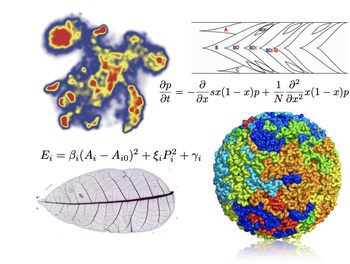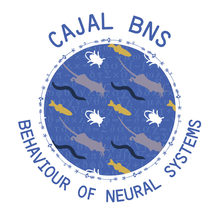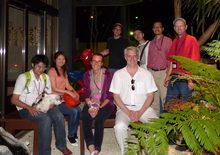Posts
Unit PI Greg Stephens elected American Physical Society Fellow
The APS fellowship was awarded “for foundational contributions to the new field of the physics of animal behavior, and especially for understanding the statistical structure and the dynamics of behavior of a nematode, C. elegans.”
How can we use partial observations to infer ensemble dynamics directly from data?
See our work (including code and examples) on maximally-predictive states and Markov chain dynamics now published in Chaos!
APS DBIO Dissertation Award to Antonio Carlos Costa
A bit delayed with the news but very happy to report that Antonio Carlos Costa has won the APS DBIO award for outstanding doctoral thesis research in biological physics. Congratulations to Antonio who is now a Junior Research Chair postdoctoral researcher at the Ecole Normale Superieure in Paris.
WormPose now published in PLOS Computational Biology
Our work using convolutional neural networks to efficently resolve coiled worm posture is now available from PLOS Computational Biology! Congratulations to lead author, software engineer Laetitia Hebert, and to the rest of our worm team for a fabulous group effort. WormPose is open-source and can be installed from a Python package.
Dynamical sytems approach to behavior now published in Nature Physics
Our dynamical systems approach to understanding the posture dynamics of the nematode worm C. elegans is now published in Nature Physics. Nice reviews of the work can be found in Nature Physics News & Views and from the OIST communications team. Special congratulations to recent OIST PhD graduate, Tosif Ahamed, as this was a primary component of his thesis work.
Physics of Behavior Virtual Meeting
Our Physics of Behavior virtual meeting (co-organized with G Berman of Emory University) centered on the question "Now that we can track (most) everything, what can we do with the data?", and was a wonderful success. Thank you to all participants! The meeting was recorded and is available through this link.
Why yes, we CAN track an entire honey bee colony without tags!
Pioneering work led by Kasia Bozek including code tutorials if you’re bored at home :) So to the physics of animal behavior on the scale of a society!
New work on nematode motility
Our first published work with the Shimizu group at AMOLF explores motility across a wide range of nematode species
Nonequilibrium sensing work published in Nature Communications
How do cells sense their environment so reliably? Our latest work with David Schwab (CUNY) & led by former unit postdoc and rising theoretical biophysicist Wave Ngampruetikorn shows that energy consumption helps, yet only for low-noise signals and cooperating sensors.
New job openings!
We have multiple job openings for postdoctoral researchers. Inquires to greg.stephens@oist.jp.
Boulder School in Theoretical Biophysics
Excited for the Boulder School in Theoretical Biophyiscs in July!

Cajal Behavior of Neural Systems
In July, the group decamped to Lisbon to help lead the Cajal Course in Behavior of Neural Systems. Join us in 2020 for the next iteration!
Visitors and new adventures for Momoko!
Theoretical biophysicists Thierry Mora, Aleksandra Walczak and their beautiful daugher Helena visit the group (though only Thierry and Aleks gave talks ;). An opporunity also to wish a fond farewell to our wonderful research administrator, Momoko Phelan, as she prepares for new adventures beyond Okinawa.
Ray defends his proposal!
Dinner after the defense with Prof. Bernd Kuhn (co-supervisor), members of the Optical Neuroimaging Unit and Prof. Michael Berry II (external examiner, Princeton University).
New Biophysics Funding
Professor Greg Stephens and a team of Dutch researchers are awarded research funding totaling 2.45 Million Euro to study the physical origins of behavioral variability in the nematode C. elegans.






